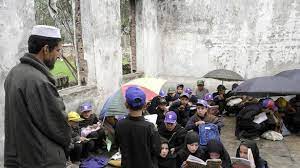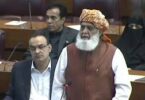F.P. Report
WANA: Once ravaged by a decade-long military operation, Rah-e-Nijat, is now facing a new battle – a deteriorating education system. The area, which witnessed a mass exodus during the operation, has struggled to recover from the scars left by militancy. As the region attempted to rebuild, the return of militants has hindered progress, leaving the people of South Waziristan grappling with dire circumstances.
The effects of the operation and subsequent displacement have been devastating for the education sector. Many teachers have sought refuge in settled areas like Tank, Dera Ismail Khan, and other regions, refusing to return to South Waziristan. They cite the lack of basic amenities, such as hotels, access to the internet, electricity, and reliable phone connections, as significant challenges.
Moreover, the dwindling student population, with only 10 to 15 students attending schools in most villages, has resulted in an unnecessary surplus of teachers. The surplus, in turn, hampers the quality of education being provided.
Adding to the challenges, some schools have been forced to close due to ongoing law and order issues. To meet enrollment targets, teachers are compelled to fabricate student numbers, while district education department officials turn a blind eye to the situation. The plight of female education is especially alarming, with female teachers having to reside in the homes of school owners due to the absence of separate female hostels. Tribal customs and the reluctance of tribal elders to send their female family members to unfamiliar accommodations exacerbate the issue, leading to compromised learning opportunities for girls.
Although the male and female heads of the District Education Office in South Waziristan are striving for change, they face resistance from long-serving subordinate staff members who possess influential connections. This impedes any meaningful action against the responsible individuals. Shockingly, these subordinate staff members have been involved in fraudulent activities, including the illicit hiring of over 2,200 teachers and misappropriation of approximately 15 crores in PTC funds.
A teacher from the Servaki division revealed that funds allocated for the construction of washrooms and play areas have vanished, benefiting only the office administration and school owners. Furthermore, it has become a trend for school owners to extort money from teachers, often amounting to 1000 to 12000 rupees per teacher per month. These unscrupulous practices allow school owners to amass significant wealth, while the quality of education suffers.
Additionally, teachers who refuse to comply with such demands are subjected to false reports filed against them, resulting in inquiries initiated by the District Education Office. Those who attempt to fulfill their duties are met with intimidation and forced eviction from their accommodations, as school owners often misuse the school premises for personal purposes.
The intermingling of school ownership with tribal power dynamics exacerbates the situation. Prominent tribal elders, who hold positions as school owners, often occupy menial roles such as guards or sweepers within their own schools. Holding such influential positions makes it nearly impossible to demand their active involvement in their designated roles, as they consider it beneath their status. This scenario is just one among many instances where influential school owners prioritize their personal interests over their educational responsibilities.
Furthermore, attempts to address the corruption within the District Education Office have faced opposition. District Education Officer, Ghulam Fatima, who championed the cause, faced backlash from tribal elders who filed baseless complaints to higher authorities, alleging her lack of understanding of local culture and traditions. The entrenched mafia within the male-dominated District Education Office has proved resilient, preventing any genuine reform.
Even the brief tenure of an honest management cadre officer, Malik Khan, appointed as Deputy District Education Officer, South Waziristan, was cut short due to his refusal to tolerate corruption. Instead, a teacher from the cadre was reinstated, further perpetuating the system of malpractice.
The deteriorating situation in South Waziristan’s education system demands immediate attention and action. Urgent measures are needed to address the challenges faced by teachers, ensure access to quality education for all, eliminate corruption, and encourage genuine reforms. The future of South Waziristan’s children hangs in the balance, and it is crucial that steps are taken to restore hope and educational opportunities in this war-torn region.







